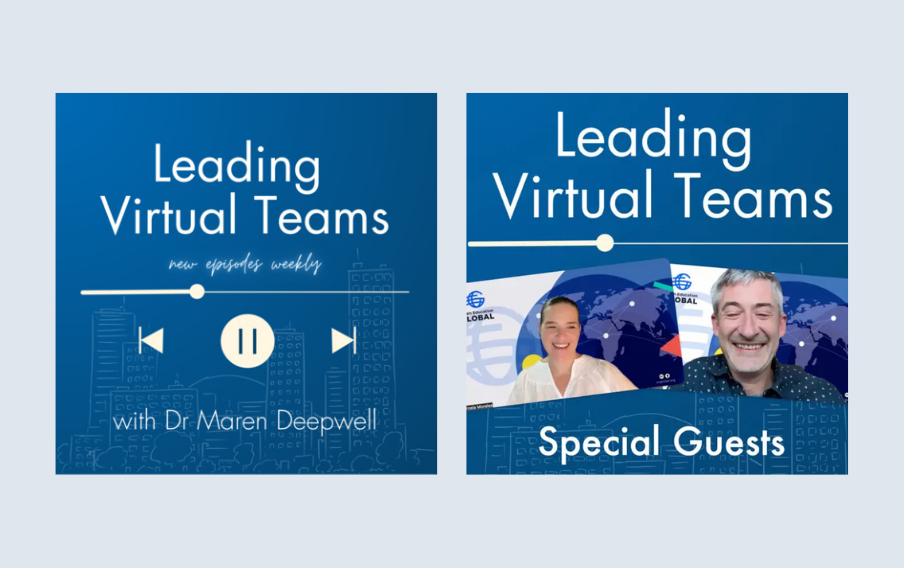
Dr Mareen Deepwell had our co-Executive Directors, Marcela Morales and Igor Lesko, on her podcast “Leading Virtual Teams“.
Marcela Morales and Igor Lesko were formally invested as co-Executive Directors of Open Education Global (OEGlobal) in November 2024. They were appointed interim co-directors of the organization in May 2023 and have been essential members of the core OEGlobal team since 2012.
In the podcast, they share their discovery of ‘open’ and different journeys towards leadership in Open Education, ultimately OEGlobal, with Dr. Deepwell.
They discuss the steps they’ve taken since 2023 to fully understand the implications and impact co-directorship would have on the organization and our wider community.
This involved an exhaustive, collaborative process involving consultants, the board members and team members to explore alternative leadership models and decision-making structures for the organization. Igor discloses that it became apparent during this discovery process that a shared leadership structure is better aligned with the transparency and shared accountability values of OEGlobal as an organisation. Marcela reiterated that it works especially well “because of the collaboration element, which is at the core of everything that we do. Including the idea that no single person has to carry everything. When you have two minds working together, it’s better than one.” It is not only shared responsibility but also the questions that both people bring to a shared issue, challenge, or leadership decision.
Despite the work already done, it is still a learning journey for them both. This impression of evolving leadership was validated in a recent training session where other co-leaders reflected on their experiences of co-leadership models; in some cases, experimenting for 3-4 years before installing the model as a permanent structure.
Other elements had to be considered and enacted before a co-leadership structure could be formalised, including discussions with the Board to ensure that the by-laws supported this kind of leadership (and other) structures in the future.
They also discussed the loneliness of leadership, which can be compounded by working remotely. Marcela reiterated that working remotely is the only way that OEGlobal has operated. She emphasized that although she did acknowledge the ‘loneliness’, she was more invested in “its counterpart, the liberty and freedom of time. And the way that you can manage your time differently in a way that is being super connected – you can send a whatsapp message and you know that you will reach that person.
“We have developed skills to be online and still have the feeling of personal connection. In my case, I do see that as a benefit (and it’s a skill that you develop with time) – balancing the online and that personal connection and the freedom and liberty of your time, but still feel that you’re connected. That personal connection you need to find somewhere else, with your family, friends or hobbies.” Although she laments, there is always the danger of losing track of time and spending hours on end in front of the computer.
Igor mentioned the impact of loneliness after having worked in an office environment; that human contact is something that you miss. This lack of human contact persists due to the limitations of time, time zones, and other pressures, and challenges the depth with which ideas and elements of the work can be discussed. He stresses that it helps to be mindful of other people’s working styles – he’s an early morning person, and has to consider time zones too.
They also discussed the team’s measures to get personal and more invested in each other. This ranges from personal sharing during weekly meetings to dedicated Slack channels to share random thoughts and events in their lives. There is always a need to engage on a more personal level. As Marcela says, there is a constant challenge with time—how to optimize our ‘prime time’ (when the team can gather with the least impact), the time to get the work done while sharing more personal moments. It helps that there are creative colleagues on the team who come up with fun ways to engage. Igor reinforces this, emphasizing the need for curiosity, empathy and compassion in all meetings and encounters. A reason behind the one-on-one meetings that are scheduled with each team member; and team adventures and sessions during the in-person meetings that are arranged every year.
As Dr Deepwell shared, open by default is not the usual approach.
Marcela shared that the team works with openness, transparency, and collaboration as default. In this way, openness is central to our internal approach, processes, and practices. We are so intricately involved in these open practices that the very thought of contemplating ‘closed’ practices sounds complex and like far too much work!
Igor added that open collaborations work best when they involve building relationships that lead to trust. Collaborations take time, and building trust, leading by example, and open communication are all important.
The points that motivates them both about the way in which they work is the global aspect of the organization – the international component across cultural elements. Connecting with people around the world, learning about the context and cultures (differences and universal similarities), and the ways in which they apply open is very inspiring.
Dr Mareen Deepwell’s podcast “Leading Virtual Teams” explores how hybrid, flexible, and virtual working are changing how we work in education and the non-profit sector. This podcast offers inspiration and practical resources for leaders developing their approach to managing people and projects. Each episode explores holistic strategies for hybrid and home-working and the skills needed in our evolving workplaces. New episodes are released each Friday.


